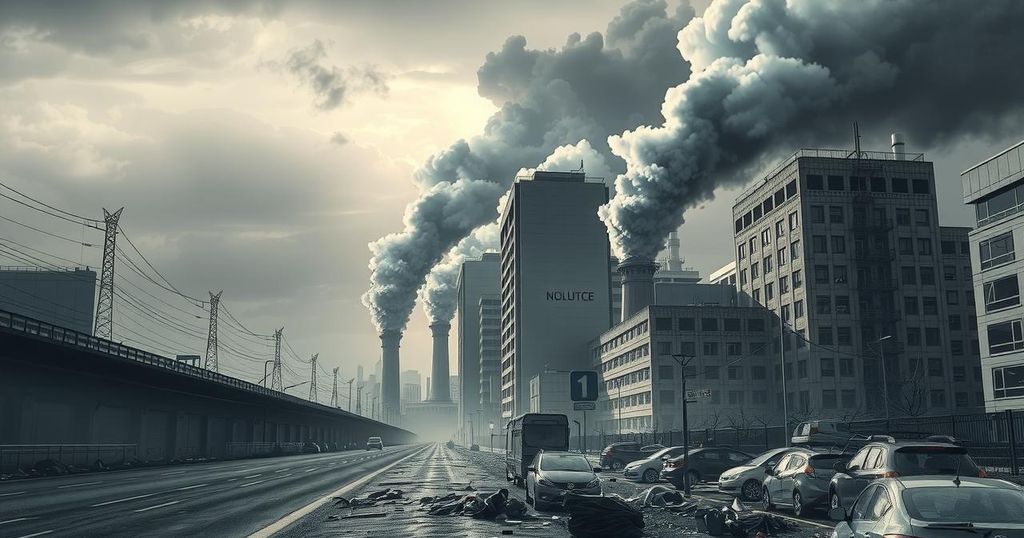Ghana, Nigeria, Chad, and Rwanda Among Most Polluted Countries in 2024 Report
The 2024 World Air Quality Report highlights alarming pollution levels in Ghana, Nigeria, Chad, and Rwanda. Chad leads globally with PM2.5 levels significantly exceeding WHO guidelines. Ghana’s pollution crisis has worsened, necessitating urgent action to improve air quality and protect public health.
The 2024 World Air Quality Report has disclosed alarming pollution levels in Africa, with Ghana, Nigeria, Chad, and Rwanda being among the most polluted nations globally. The report underscores a concerning air quality crisis that poses a significant threat to numerous lives across the continent.
Chad emerged as the most polluted country worldwide, featuring a staggering PM2.5 concentration of 91.8 µg/m³, which is nearly eighteen times above the World Health Organization’s (WHO) annual guideline of 5 µg/m³. Nigeria ranked eleventh with 40.1 µg/m³, while Rwanda was ninth at 40.8 µg/m³, and Ghana positioned fourteenth with 35.8 µg/m³.
The PM2.5 particles, known for their dangerous health implications, can penetrate deep into the lungs and bloodstream, leading to severe respiratory and cardiovascular diseases. These particles are considerably smaller than dust and hair, making them highly toxic despite their invisibility.
According to the University of Chicago’s Air Quality Life Index (AQLI), air pollution is reducing lifespans in polluted regions by an average of 2.7 years. In Ghana, an estimated 28,000 individuals die annually due to air pollution, as highlighted by WHO in 2019. The report from 2021 documented 8.1 million global deaths attributed to air pollution, underscoring a public health emergency.
Air pollution in Ghana has worsened significantly, with levels now seven times higher than WHO’s safety limit. The capital city, Accra, ranked sixteenth worldwide for pollution, recording a PM2.5 level of 36.3 µg/m³. Notably, Kumasi is now reported as Ghana’s most polluted city at 39.5 µg/m³. Ghana has seen a consistent rise in pollution from 30.2 µg/m³ in 2022 to 35.8 µg/m³ in 2024.
The report emphasizes Africa’s struggle with air pollution, with five of the world’s ten most polluted countries situated on the continent. A mere 24 out of 54 African nations provided air quality data, highlighting significant monitoring gaps. Additionally, 34% of African cities experienced PM2.5 levels three to five times above WHO guidelines.
The air pollution issue in Ghana extends beyond environmental concerns; it constitutes a severe national health crisis. If the current trajectory continues, air pollution could lead to an estimated 2,333 deaths each month. Urgent measures are necessary to mitigate exposure and address public health risks linked to PM2.5 pollutants.
Globally, while only 17% of cities meet the WHO air quality guideline, there are regions successfully maintaining cleaner air. The report identifies Chad as the most polluted country, followed by Bangladesh and Pakistan. Conversely, countries like Australia and New Zealand demonstrate adherence to WHO guidelines.
Key drivers of Africa’s air pollution include rapid urbanization, industrial emissions, and the unregulated burning of waste. Notably, NGOs have significantly contributed to air quality data collection across Africa, emphasizing the need for more comprehensive governmental monitoring initiatives.
As the air quality crises intensify in Ghana and other African nations, calls for immediate action are growing. Experts advocate for stricter vehicle emission regulations, increased renewable energy investments, expanded air quality monitoring infrastructure, and the implementation of stringent anti-burning policies. The urgency for action is paramount as conditions continue to deteriorate, necessitating a concerted effort to combat this escalating environmental crisis.
The 2024 World Air Quality Report reveals a dire situation regarding air pollution in Ghana and other African nations, particularly highlighting Chad, Nigeria, and Rwanda. The significant rise in PM2.5 levels poses severe health risks and underscores the urgency for action. With Ghana ranking among the top polluted countries, it is crucial to implement effective environmental policies and enhance monitoring infrastructure to mitigate the impact of air pollution and safeguard public health.
Original Source: www.myjoyonline.com




Post Comment